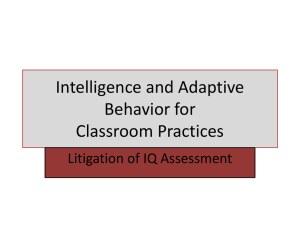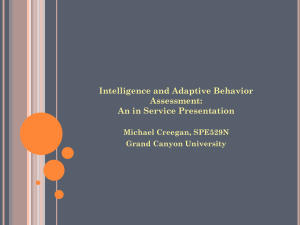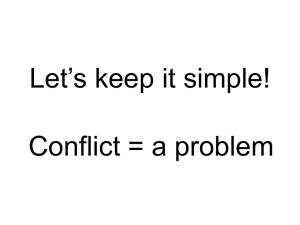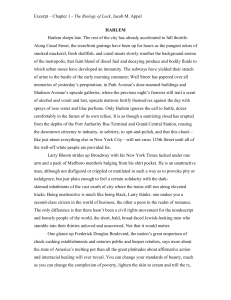Intelligence and Adaptive Behavior for Classroom
advertisement
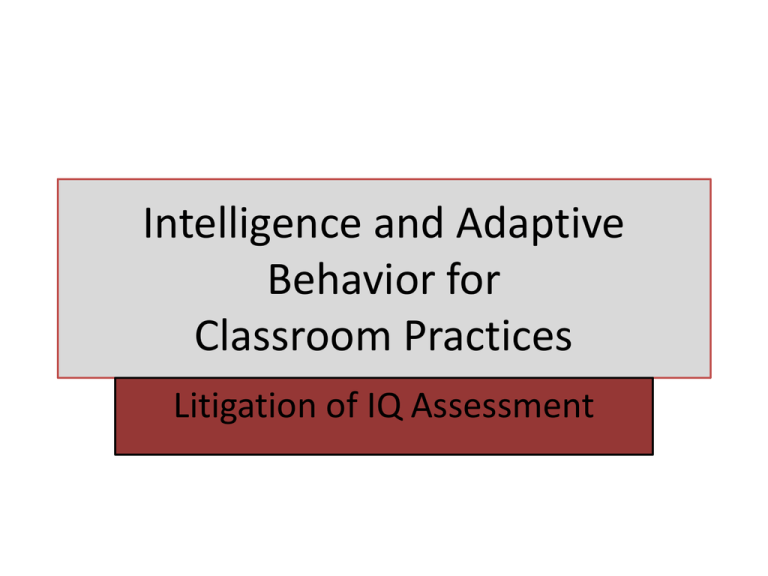
Intelligence and Adaptive Behavior for Classroom Practices Litigation of IQ Assessment Intellectual Functioning • "General intellectual functioning" is typically measured by an intelligence test. Persons with mental retardation usually score 70 or below on such tests (or at least 2 standard deviations below the mean on the normal curve). IQ Testing • Intelligence Quotient – score derived from several standardized tests designed to assess intelligence. Adaptive Behavior • "Adaptive behavior" refers to a person's adjustment to everyday life. It refers to an individual’s ability to meet social requirements of his or her community that are appropriate for his or her chronological age. It is an indication of independence and social competency. Classroom Support The 4 Levels of Intensities and Supports (from least to most intensive and supportive) 1. Intermittent 2. Limited 3. Extensive 4. Pervasive Classroom Strategies • Allow for many breaks throughout the school day. Children with MR may require time to relax and unwind. • Always speak directly to the child so he can see you-Never speak with your back to him. • Assign jobs in the classroom for the child so that he can feel success and accomplishment. • Build a foundation of success by providing a series of short and simple assignments. • Encourage interaction with other children. Vineland Adaptive Behavior Scale This test is the measurement of the adaptive behaviors, including the ability to cope with environmental changes, to learn new everyday skills and to demonstrate independence. test measures five domains. Comprehensive Testing of the following: Communication, Daily Living Skills, Socialization, Motor Skills, and Maladaptive Behavior domains. Larry P. v. Riles • Landmark case tried in US Court of Appeals, 1984 • Issue: CA placed children in special classes – Used standard I.Q testing to place 6 black schoolchildren – Children identified as mentally retarded (EMR) • IQ testing only criterion used • Children placed in special class Larry P. v. Riles • Educable mentally retarded – Labeled as incapable of being educated – Used as evaluation method by CA schools – Based on IQ standard IQ testing Larry P. v. Riles • Involved parties – Larry P., Plaintiff • Young black boy + 5 other classmates with EMR • Claimed IQ tests biased • Violated 14th amendment rights – California school system, Defendant • Case reasoning – Larry P. argued that children had been placed incorrectly in EMR classrooms Larry P. v. Riles • Main points of disagreement – CA placed children only on basis of IQ scores • IQ tests not validated for black students – Larry P. claimed that IQ testing discriminatory • Majority of labeled as EMR were black – 1968-1969, 9% of CA state school population → black – Made up 27% of EMR group Larry P. v. Riles • Outcomes – Court ruled • IQ tests culturally inappropriate for black children • Banned CA school system from using IQ tests for blacks • Required a different evaluation system • Demanded CA keep records of students enrolled in EMR classrooms, including racial data • Demanded CA prove reasoning for black students to be labeled EMR Larry P. v. Riles • Implications for today – Tests given to evaluate minority children be validated for given population – Gives legal precedent for outlawing the use of cultural bias as evaluation method References • http://sped100fall07.wikispaces.com/Larry+P.+vs.+Riles. Downloaded August 9, 2010. • http://www.inmotionmagazine.com/peterz1.html. Downloaded August 9, 2010 • http://learningdisabilities.about.com/od/medicalinterventi ons/g/adptbehvrdeffin.htm. Downloaded August 9, 2010. • http://www.brighthub.com/education/special/articles/135 06.aspx. Downloaded August 9, 2010. • Gill, W. (1992). Helping African-American males: The cure. The Negro Educational Review, 63, 31-36. • Grant, P. (1992). Using special education to destroy Black boys. The Negro Educational Review, 63, 17-21.
